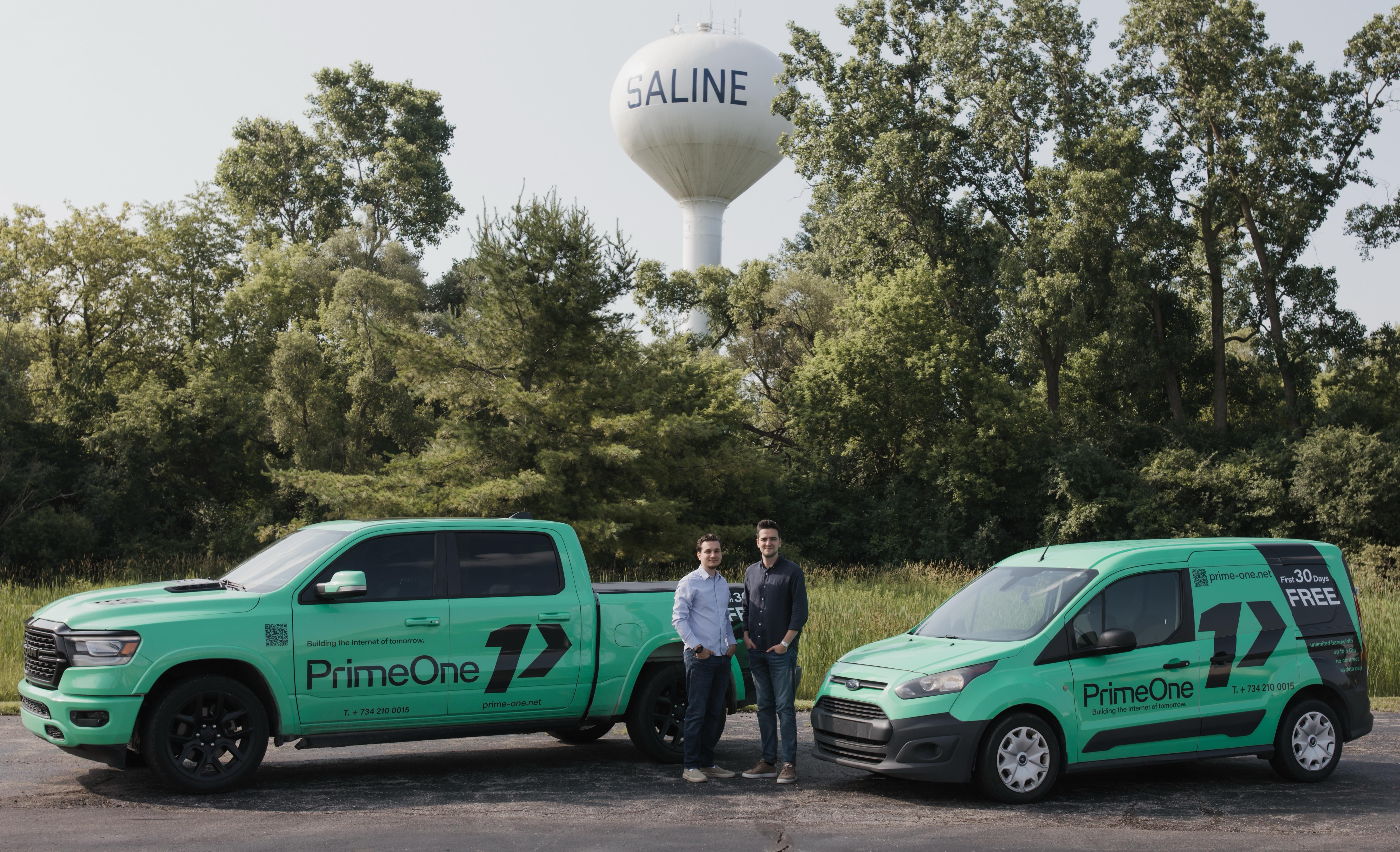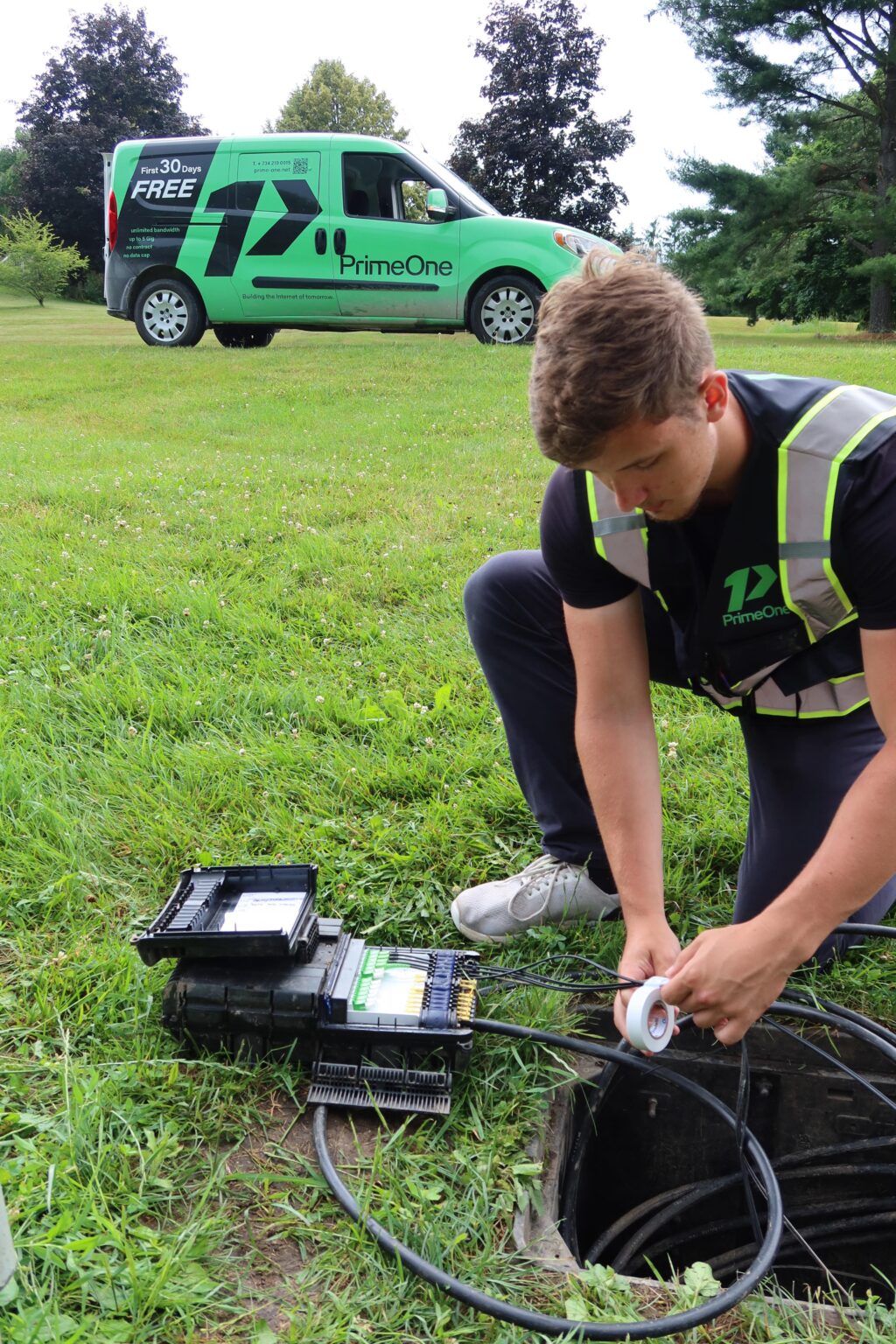Samuel Herman and Alexander Baciu never liked using Comcast’s cable broadband. Now, the residents of Saline, Michigan, operate a fiber Internet service provider that competes against Comcast in their neighborhoods and has ambitions to expand.
“All throughout my life pretty much, I’ve had to deal with Xfinity’s bullcrap, them not being able to handle the speeds that we need,” Herman told Ars. “I lived in a house of 10. I have seven other brothers and sisters, and there’s 10 of us in total with my parents.”
With all those kids using the Internet for school and other needs, “it just doesn’t work out,” he said. Herman was particularly frustrated with Comcast upload speeds, which are much slower than the cable service’s download speeds.
“Many times we would have to call Comcast and let them know our bandwidth was slowing down… then they would say, ‘OK, we’ll refresh the system.’ So then it would work again for a week to two weeks, and then again we’d have the same issues,” he said.
Herman, now 25, got married in 2021 and started building his own house, and he tried to find another ISP to serve the property. He was familiar with local Internet service providers because he worked in construction for his father’s company, which contracts with ISPs to build their networks.
But no fiber ISP was looking to compete directly against Comcast where he lived, though Metronet and 123NET offer fiber elsewhere in the city, Herman said. He ended up paying Comcast $120 a month for gigabit download service with slower upload speeds. Baciu, who lives about a mile away from Herman, was also stuck with Comcast and was paying about the same amount for gigabit download speeds.
$80 for gigabit fiber, unlimited data
Herman said he was the chief operating officer of his father’s construction company and that he shifted the business “from doing just directional drilling to be a turnkey contractor for ISPs.” Baciu, Herman’s brother-in-law (having married Herman’s oldest sister), was the chief construction officer. Fueled by their knowledge of the business and their dislike of Comcast, they founded a fiber ISP called Prime-One.
Now, Herman is paying $80 a month to his own company for symmetrical gigabit service. Prime-One also offers 500Mbps for $75, 2Gbps for $95, and 5Gbps for $110. The first 30 days are free, and all plans have unlimited data and no contracts.
“We are 100 percent fiber optic,” Baciu told Ars. “Everything that we’re doing is all underground. We’re not doing aerial because we really want to protect the infrastructure and make sure we’re having a reliable connection.”
Each customer’s Optical Network Terminal (ONT) and other equipment is included in the service plan. Prime-One provides a modem and the ONT, plus a Wi-Fi router if the customer prefers not to use their own router. They don’t charge equipment or installation fees, Herman and Baciu said.
Prime-One began serving customers in January 2025, and Baciu said the network has been built to about 1,500 homes in Saline with about 75 miles of fiber installed. Prime-One intends to serve nearby towns as well, with the founders saying the plan is to serve 4,000 homes with the initial build and then expand further.
“This is our backyard”
Herman and Baciu’s main competition in their initial build area is Comcast and Frontier’s DSL service, they said. So far, they have built only to single-family homes, but they plan to serve multi-unit residential buildings, too.
“We started building in an area that’s a lot more rural,” where people have fewer options than in more densely populated areas, Herman said. “This is our home, this is our backyard, so we take this build very, very seriously.”
Baciu, who is 29, said that residents seem excited to have a new Internet option. “It’s so nice to see the excitement that they have. [People say], ‘Oh my gosh, I told everybody about Prime-One. My neighbor cannot wait for you guys to have them up, too. My boss is asking, my grandma’s asking.’ It’s a beautiful thing,” he said.
A bit more than 100 residents have bought service so far, they said. Herman said the company is looking to sign up about 30 percent of the homes in its network area to make a profit. “I feel fairly confident,” Herman said, noting the number of customers who signed up with the initial construction not even halfway finished.
Prime-One’s founders originally told us the 4,000-home build would be completed at the end of August, but Baciu indicated more recently that it will take longer than that. “We are working on sales for the next couple of months before continuing the rest of the build,” Baciu said.
Herman and Baciu started thinking about building an ISP about two years ago. With no fiber companies looking to compete against Comcast where they lived, “that was a trigger,” Baciu said. “We kept on talking. We’re like, hey, we’re doing this work for other people, why not?” In August 2024, they signed a contract with a firm that provides backhaul service, IP address assignments, and other key connectivity needs.
“We said, ‘let’s try to do it ourselves’”
ISPs generally want to build in areas where homes are built close together, requiring less fiber construction to serve more customers and make a bigger profit. Existing ISPs didn’t seem interested in expanding to where Herman and Baciu live, Herman said.
“We have spoken to all of these Internet service providers and asked them to come and service these areas. I knew that there was a dire need in this area and that everybody was sick of the Xfinity BS,” Herman said.
Having worked in construction for ISPs, they already had experience installing fiber lines and conduits.
A Prime-One installer working on a fiber build. Credit: Prime-One
“We said, ‘you know, what the hell, why not? Let’s try to do it ourselves,'” Herman said. “We know we can handle the construction, we know we can handle all that area. We need some assistance on the technical side. So we hired the right people to handle the technical side and to handle the OSS/BSS software and to manage our dark fiber. And from there, we’re here where we’re at, within six months. We have over a hundred customers on our network, and we’re still building.”
Before construction, the brothers-in-law met with Jared Mauch, a Michigan man who built a fiber-to-the-home Internet provider because he couldn’t get good broadband service from AT&T or Comcast. We wrote about Mauch in 2021, when he was providing service to about 30 rural homes, and again in 2022, when he was expanding to hundreds of more homes.
Though Herman and Baciu already knew how to install fiber, Mauch “gave us quite a lot of insight on what to do, how to build, and on the actual ISP side… he showed us the way he did things on the technical side for the ISP, what strategies he used and what products he used,” Herman said.
The brothers-in-law didn’t end up using all the networking products Mauch suggested “because we are building a much larger network than he was,” Herman said. They went mostly with Nokia products for equipment like the optical network terminal installed at customer homes, he said.
Local employees
Baciu said he was frustrated by Comcast customer support being mostly limited to online chats instead of phone support. Prime-One has 15 local employees, mostly installers and technicians, with other employees working in customer service and operations, Herman said.
Prime-One offers phone and chat support, and “many people want to be able to see someone face to face, which is very easy for us to do since we have people here locally,” Herman said.
Network uptime has been good so far, Herman and Baciu said. “The only outage we’ve had was due to severe weather that caused a massive outage” for multiple networks, Herman said. “Any time any customers are experiencing an outage, maybe because of a lawnmower that cut their service line or anything, we guarantee a two- to four-hour time to repair it. And on top of that, to promote the fact that we discourage outages and we are working our best to fix them, we offer $5 back for every hour that they’re out of service.”
Comcast seems to have noticed, Herman said. “They’ve been calling our clients nonstop to try to come back to their service, offer them discounted rates for a five-year contract and so on,” he said.
Comcast touts upgrades, new unlimited data option
A Comcast spokesperson told Ars that “we have upgraded our network in this area and offer multi-gig speeds there, and across Michigan, as part of our national upgrade that has been rolling out.”
Meanwhile, Comcast’s controversial data caps are being phased out. With Comcast increasingly concerned about customer losses, it recently overhauled its offerings with four plans that come with unlimited data. The Comcast data caps aren’t quite dead yet because customers with caps have to switch to a new plan to get unlimited data.
Comcast told us that customers in Saline “have access to our latest plans with simple and predictable all-in pricing that includes unlimited data, Wi-Fi equipment, a line of Xfinity Mobile, and the option for a one or five-year price guarantee.”
Prime-One’s arrival on the scene caught some local people’s attention in a Reddit thread. One person who said they signed up for Prime-One wrote, “I’m honestly very impressed with the service overall. Comcast was charging me for every little thing on my account and the bill always found a way to get higher than expected, especially going over my data cap. Prime-One has no data caps and the bill has been the same since I first joined, not to mention they offer the first month free… I’m happy to see a company come out here and give us a better option.”
Comcast is facing competition from more than just Prime-One. The City of Saline government recently said there’s been an uptick in fiber construction in the city by Metronet and Frontier. Baciu said those builds don’t appear to be in the areas that Prime-One is serving. “To our knowledge, both Frontier and MetroNet have recently begun building in adjacent areas near our current footprint, but not within the zones we’re serving directly,” he said.
While Prime-One is a small ISP, Herman said the company’s expansion ambitions are bigger than he can reveal just now. “We have plans that we cannot disclose at this moment, but we do have a plan to expand,” he said.


